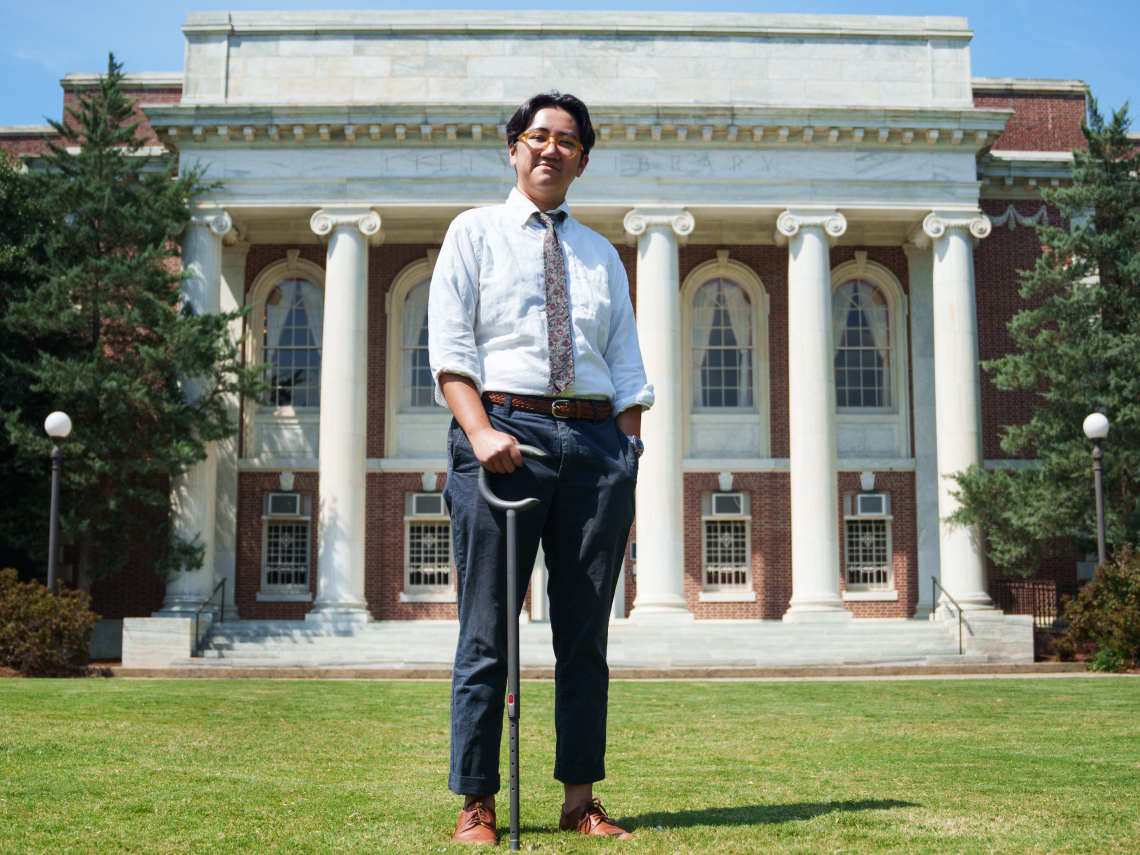Elizabeth Thompson, Trinity Communications

While the COVID-19 pandemic delayed or derailed fieldwork for many up-and-coming scholars, Emily Lim Rogers’ research never slowed down. Working as a medical ethnographer researching myalgic encephalomyelitis/chronic fatigue syndrome (ME/CFS), social distancing practices were already the norm for the communities she was engaging with.
“For my interlocutors, the life of staying at home, and the real isolation that sometimes comes with that, was not new during the pandemic as it was for non-disabled, non-chronically ill people,” she said.
Rogers, who is joining the Cultural Anthropology faculty this Fall as an assistant professor, became interested in ME/CFS in 2015 as a graduate student at New York University (NYU). Although there was already research being done within the medical humanities and social sciences on other contested illnesses, such as fibromyalgia, she noted that very little was published about the experiences of those who live with ME/CFS. Because the disease is still poorly understood, the symptoms of those who suffer from it are often dismissed by health care professionals.
A vibrant activist community surrounds ME/CFS, however, and Rogers linked into it easily. She connected online with groups in New York and San Francisco, two hubs of activism, “even before everybody downloaded Zoom,” she said with a laugh.
Rogers quickly realized that ME/CFS activists face unique challenges. “As an interlocutor told me, it's called ‘activism’ for a reason,” she said. “They have to act and have energy, and they can't really do that as people with ME/CFS. So, what I found is there's a double bind. Because people with ME/CFS lack energy, they can’t perform traditional activism, requiring action, in order to change the dismissal of ME/CFS so that they’ll receive treatment that will lead to them having more energy.
“Going into my research, I underestimated the centrality of embodiment to activism. There are conversations within the ME/CFS community about this: ‘How do we advocate for ourselves when we can't get out of bed?’”
As she spoke with patients and family members about their experiences, Rogers realized that ME/CFS acts as a prism that reveals a great deal about American work culture, as well as our healthcare system.
“The idea of ‘fatigue’ emerged with the advent of industrial scientific management,” she said. “ME/CFS poses questions about the state, the family, about capitalism and the way privatized health care insurance works. Patients with ME/CFS live in fatigued bodies that must also work against the systems of medical doubt, of bureaucratic systems that exhaust them and of people not understanding what they're going through.”
Rogers’ scholarship is about action, as well as research. While working on her Ph.D. at NYU, she was administrator of the university’s Center for Disability Studies. She used her experience to cofound the Disability Studies Working Group at Brown University in 2022, where she was a Mellon Postdoctoral Fellow.
“Institution building is in my blood,” she observed. “I can’t not do it.”
Rogers is hitting the ground running this semester with a class called “Bodies at Work” (CULANTH 242S), which examines the interrelation between bodies, disability/ability and the way conceptions of disability fluctuate with arrangements of capitalism, both culturally and historically.
“We look at how what is considered a disability in one culture might not be in another, and how disability can be literally created by, say, industrial accidents,” she said. “It can also be created by what a society demands of a worker. This class looks at disability in the body not as a static or biological entity, but as something that is continually shaped and formed and reformed.”
Rogers foresees an upsurge in student interest in disability studies in the coming years, and Duke is well-positioned to be in the forefront of this emergent field. She notes the reputation of the university’s medical school, as well as students’ interest in policy and activism.
“One of the things I love is that I'm able to create my own classes, in addition to making sure that students are getting the basics they need in this area of study,” she said.
She was also drawn to Duke by the work of her colleague, medical anthropologist Harris Solomon, and the support she feels from the Department of Cultural Anthropology.
“Duke and the Department of Cultural Anthropology have made me more excited about my work, and what I can contribute, than ever before,” she said before pausing, considering. “I didn't even know I could be that excited about my work. I really didn't.”